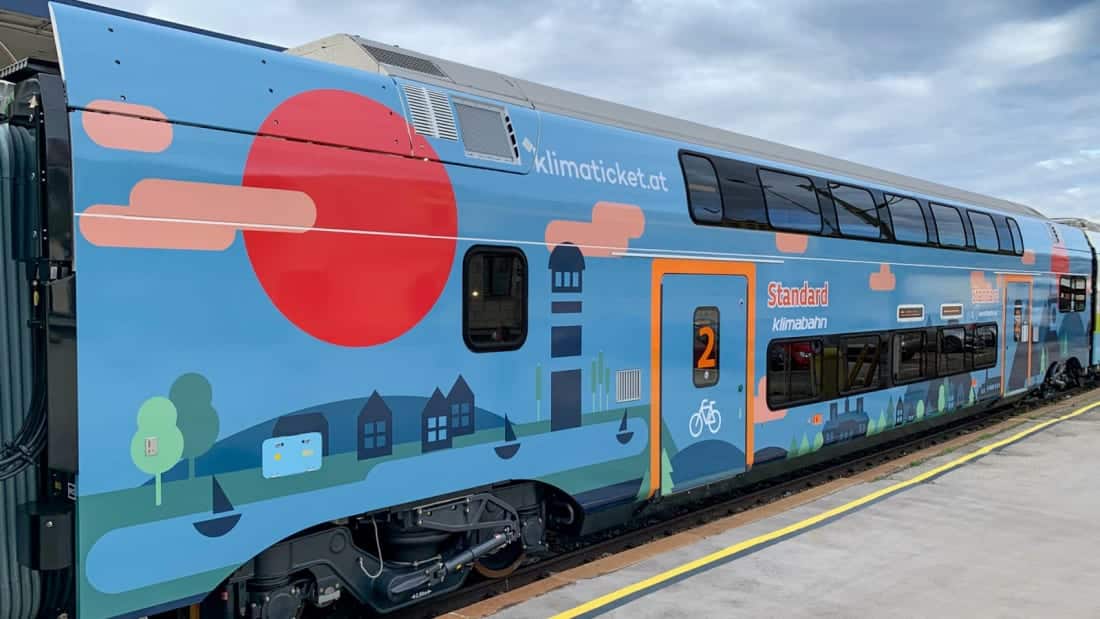Train travel to help save the planet!
Tue 26 Oct 2021
Fifteen years after it was first proposed, Austria’s new Klimaticket, or climate ticket, goes live on October 26 which would mean an epic ride across Europe costs just $3.50 (AED13). Offering seamless travel across all modes of public transport is intended to galvanize the Alpine nation’s fight against climate change.
The annual pass, priced at $1,267 (AED4,654), works out at just $24 (AED88) per week or $3.50 (AED13) a day. If all goes according to plan, it should encourage people to swap their cars for more climate-friendly forms of getting around.
Public transport is already popular in Austria. Its combination of reliable, high-quality, integrated services, simple ticketing, and attractive pricing have long made it a winner for commuters and leisure travelers.
Yet even though Austrians travel more kilometers by train every year than everyone in Europe except the Swiss, according to official government figures only 16% of journeys in 2018 were made by public transport.
It’s hoped that Klimaticket will change that by making it much more affordable and convenient, especially for regular users.
The signs are positive, with an initial interest in discounted early bird tickets so strong that the booking website www.klimaticket.at immediately crashed.
Spearheading the initiative is Austria’s Green Party “superminister” Leonore Gewessler, whose responsibilities include climate action, environment, energy, mobility, innovation, and technology in the current coalition government.
“I think you can see how happy I am. This is a big day for the climate and for transport. If this summer has shown us anything, it is that the climate crisis has already arrived with us,” she said after announcing the deal.
National passes and discount cards are nothing new in Europe. Switzerland, Austria, and Germany, among others, offer monthly travel passes, half-fare cards, and other discounts to encourage public transport use.
What makes Austria’s new offer different is its remarkably low price.
Switzerland’s General Abonnement (GA) travelcard offers unlimited use of the Confederation’s entire public transport network but costs three times as much. A similar annual ticket for buses, trains, and metro in the Netherlands are more than $3,500 (AED12,856).
“One of the things I like about Klimaticket is that it is valid on all modes of public transport, a concept that should be replicated elsewhere as it removes the hassle of having to find and buy multiple tickets. It is potentially revolutionary, removing some of the barriers to using public transport and making spontaneous trips much easier as you don’t have to worry about buying tickets, which can often be expensive at short notice for longer journeys,” said European rail travel expert Andy Brabin.
A passenger on an electric train requires just 55% of the energy used by a battery-electric car for the same journey, according to the master plan, meaning big carbon emission cuts can be made with a relatively small percentage shift to more sustainable modes of travel.
Of course, it hasn’t exactly been a smooth journey to get to this point. Klimaticket is the result of 18 months of often-heated negotiations between federal and regional governments, transport organizations, and providers.
The past two years saw Intense debate and criticism, especially from more rural regions where public transport density and usage are at their lowest. Opposition parties have welcomed the introduction of the ticket but said it was only a first step toward meeting climate goals.
Johannes Margreiter, the transport spokesman for the liberal Neos party, said: “Price isn’t the reason why people do not switch to public transport. In many places, the problem is the lack of availability because of poor or absent connections.”
Austria has perhaps succeeded because it’s a relatively small country with a well-funded, cohesive, and popular public transport system already in place. Others without this could struggle to emulate its achievement.
Klimaticket is just one plank of Austria’s plan to meet its carbon reduction targets, but if it delivers positive results quickly, as its supporters believe it will, pressure could grow to develop similar products in other countries around the world that make mobility without a car easier and more cost-effective.
Source: Agencies

 Apr 26 2024
Apr 26 2024













